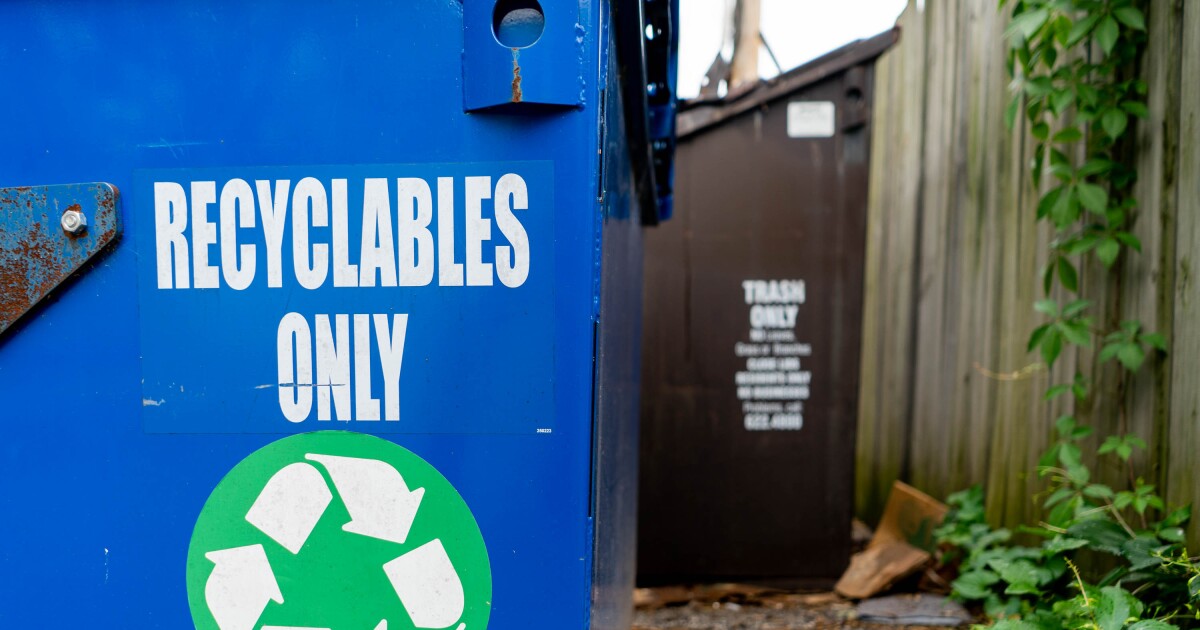St. Louis is officially moving away from single-stream recycling.
Ben Jonsson, the city’s chief operating officer, presented a replacement plan for alley collection to members of the aldermanic Public Infrastructure and Utilities Committee on Thursday. It will be rolled out in its entirety within a year.
“Mayor [Cara] Spencer and the administration are committed to a citywide recycling program with the goal of reducing landfill use, promoting environmental stewardship and encouraging sustainable behaviors,” Jonsson said. “We are very open to getting this right for the residents of St. Louis.”
Mayor Cara Spencer’s administration has been telegraphing the move since May, when former interim streets director Jim Sulemann called for the end of alley recycling at a Budget and Public Employees Committee meeting.
The key problem with alley recycling is contamination. More than 50% of material collected through all methods — roll carts, alley dumpsters and drop-off sites — between January and May of this year was rejected at a recycling center for that reason. That meant the city paid a higher recycling fee without getting any of the benefits.
But when the city looked at data for two weeks in July, when recycling was collected from roll carts and drop-off sites alone, the contamination rate dropped to 25% or less.
Within 90 days, the city will expand the number of recycling drop-off sites, with the goal of having a location within a mile of every resident. The blue alleyway bins will be relabeled and treated as regular dumpsters. The city will also spend the next three months auditing refuse collection and billing, in an effort to bring in more funding for waste pickup.
The change will not impact residents who use roll carts for trash and recycling. They make up about 20% of the population.
Single-stream recycling began in the city in 2011. It was part of a legislative package that included, for the first time, an additional fee for trash collection. That monthly charge is now $14.
But in recent years, the city has been forced to pause the program for extended periods. A staffing shortage led to a roughly one-year halt during the pandemic. And after the May 16 tornado, refuse workers began commingling trash, yard waste and recycling in order to free up resources to collect storm debris.
Residents react
The decision to end alley recycling for the near future was roundly panned by environmental organizations in attendance at the meeting.
“When we’re looking at city services, protecting the environment should be done at any cost,” said Maxi Glamour, the Ward 3 Democratic committeeperson and an environmental activist. “No amount of money in the world equals the importance of the world.”
Jessica Watson, executive director of earthday365, said she was pleased to hear that the city would be adding another dozen or so drop-off locations.
“But it is very important to acknowledge that this system is far less accessible for the elderly, for those with disabilities, for those who lack transportation and even just those who live in apartments and lack storage space,” she said.
Alderwoman Alisha Sonnier of the 7th Ward asked Jonsson if the administration would be willing to work with the city’s Office on the Disabled to get roll carts to seniors or others who have applied for accessible parking in front of their houses. While he would not commit to the idea, Jonsson said he was willing to work with Sonnier on that issue.
This story has been updated.
